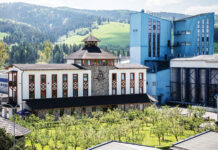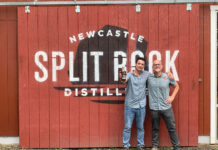“We must free ourselves of the hope that the
sea will ever rest. We must learn to sail in
high winds.” – Aristotle Onassis
I have two Kurdish refugees living above my garage.
Whenever I feel overwhelmed by how much my world has changed since March 1, I think of them. They are young college students away from their families, stuck in a country that offered them political asylum once and now wishes they would go home. They have no dorms to live in and they have lost their college health insurance.
Rahmi has worked part-time at my distillery on a J4 visa for nearly three years. He’s part of the family. I can’t use my PPP loan to pay his wages. He can’t access unemployment or get a stimulus check. He and his roommate do not have money for plane tickets to return home and likely if they did, Turkey may be unsafe for them. My conscience would not let me lay him off. I continue to pay his wages and put him to work on as many tasks as I can muster. And when he and his roommate lost their dorm room, I offered him a place to live.
Welcome to sustainability in the age of COVID-19. Everything is upside down.
One of my colleagues laid off 130 people on one day. I decided to sail this sustainable company straight into the maelstrom of the pandemic with my full crew intact. We were either a family or we were nothing at all.
On March 1, my rum bar and restaurant were at standing-room-only capacity, packed with tourists and locals enjoying live music. I had just closed on the purchase of the commercial building that houses my distillery and tasting room operation. My distillery was in the middle of a major expansion, more than doubling capacity. Equipment orders had been placed and custom work was underway on a new still. I had recently shipped pallets to London for a product launch there. I had just put the finishing touches on a fantastic new company office and hired four professionals to help me handle growth, bringing my headcount to 30. At home, I was halfway through building a sustainable home. I had two kids away at private colleges.
Fifteen days later, we closed our doors due to our first staff case of COVID-19.
Crested Butte, Colorado, was washed over by a viral outbreak the likes of which I had never imagined. My friends, employees and colleagues began to drop like flies to an illness that made them sicker than anything I have ever seen.(Seventy days later, many of them are still struggling.) Locals, including some fellow business owners, were flown to a regional ICU because we don’t have one here. Some died, most pulled through. Our town of 2,500 year-round residents became a COVID-19 hot spot and our case rate quickly became the highest in America.
Every morning I asked myself the same question: How does one captain a sustainable B-Corp into and through a pandemic? This must look different. Maybe we can be better when this is all over, if we can survive.
I only had a few strong instincts, but they were the same ones I have always had.
- Our natural environment is under siege.
- Any system can be dismantled and rebuilt better.
- Our people matter more than profits and dividends.
- We won’t suddenly change our ethos because cash flow crashed and the future is uncertain.
The future has always been uncertain.
I always look hard at every aspect of my company from the sustainability angle, but this time I had to use the pandemic lens. Isn’t this what we had been designing for all along? Responsible survival in an unsure, changing environment?Every distiller will have to answer these questions her own way, but in the interest of mutual support for the distilling community, here’s my own thought process.
- Would we lay off staff and cancel benefits? No, we would hold them all on payroll to keep their health benefits, disability options, life insurance, telemedicine, dependent benefits, FMLA and sick leave intact. I spent many hours on the phone with my banker and accountants. I wanted to survive this by doing right by staff because they were the key to our quick return to normal. It would cost more to train new staff from scratch or rebuild a reputation hurt by employees who felt abandoned than to keep them on payroll until PPP/EIDL kicked in.
- Would we shut down distilling? Temporarily buy ingredients from vendors who had not been vetted through our rigorous B-Corp filter? No. Our farms and mill in Louisiana saw shutdowns looming due to coronavirus, so we worked together to stockpile supplies before they closed. This kept us in production, making sanitizer, and allowed us to support the family partners who are as impacted as we are. In the world of fine aged spirits, we are accustomed to taking on expense years ahead of revenue, so the model wasn’t new.
- Would we furlough sales staff because the entire on-premise sector of business was in lockdown? No, we would allocate their time heavily to cultivating new online and delivery channels. We would make up for lost on-premise sales with growth on the innovative off-premise side. And yes, we would still offset the carbon impact of shipping and delivery, as we do with freight.
- Would we be able to keep all our staff busy even closed to the public? Yes, because before coronavirus there never seemed to be a free minute to get caught up. We made the master list of everything we had been putting off, everything that need to be painted, reorganized, cleaned, improved and repaired and ticked it off over the next two months.
- Would we do take-out cocktails and food when our company stands so strongly against single-use containers and plastic? Yes, but we would do it differently. We set up a station outside our doors where customers may transfer drinks and food to their own containers in a sterile environment. (Yes, we clean it obsessively between every use.)
- Would we close our company offices when marketing, PR, design and admin staff were sent to work from home? No, we made safe spaces available to community members whose family situations made working from home hard. We converted our empty conference room for a rural worker who couldn’t take Zoom calls at home due to bad internet. (We hate waste, even when it comes to office space.)
- Would we wait and hope that help would arrive? No, we would be the help. Sanitizer was just one tiny effort. We didn’t do any of it for the PR, just to be true to our ethos. One satisfying task for me was leading a regional task force and helping more than 25 other local businesses plan for financial survival and a second wave.
Every disaster has a silver lining.
For me, it is knowing I stayed true to my values and to the people who depend on me. It is sitting around the backyard fire with the Kurds and knowing they are safe for now.








